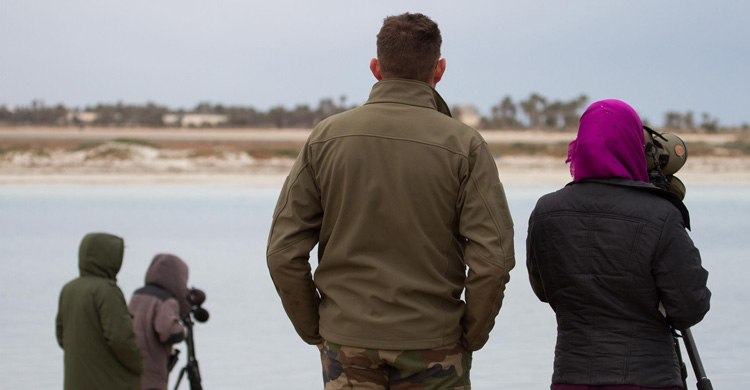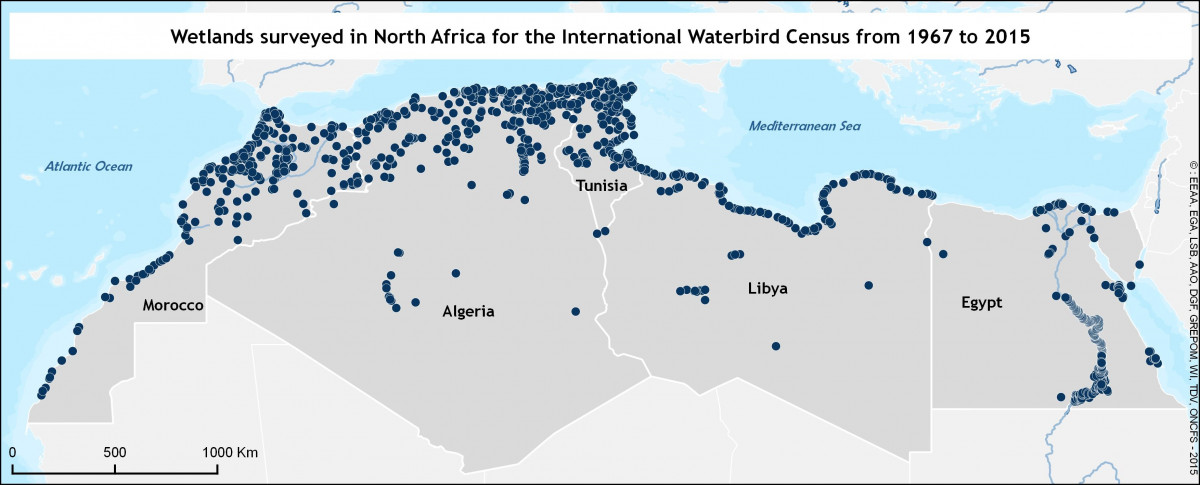The 5 North African Countries Update and Share Their Entire International Waterbird Census Database

© Hichem Azafzaf
Guest article by Tour du Valat
Bonn, 17 February 2017 - The Mediterranean waterbirds network was launched in 2011 by the Tour du Valat research centre for the conservation of Mediterranean wetlands (TdV) and the French Agency for Wildlife and Hunting Management (ONCFS) in order to improve and strengthen the International Waterbird Census (IWC) in the Mediterranean, with a special focus on North Africa. This network had been supported by the MAVA Foundation for Nature and the French Ministry for Environment, Energy and the Sea (MEEM) and was primarily constituted by Groupe de Recherche pour la Protection des Oiseaux au Maroc (Morocco), Direction Générale des Forêts (Algeria), Association "Les Amis des Oiseaux" (Tunisia), Environment General Authority (Libya), the Libyan Society For Birds and the Egyptian Environment Affairs Agency. These partners contributed to the development of tools for data sharing, including a charter and a web platform: the Medwaterbird web site, which is supported by TdV and freely available for all data collectors, providers and managers across the whole Mediterranean.
In November 2016, after several years of concerted effort in database management with the support of TdV, ONCFS and MEEM, the five North African countries (Egypt, Libya, Tunisia, Algeria, Morocco) have decided to share their fully revised and updated IWC database with the NGO Wetlands International!
This massive update of the last 15 years of IWC data in North Africa corresponds to an increase of 38,000 data records on 491 sites, and of over 9,000,000 waterbirds as compared with the previously available database version. Conscious that North African wetlands are crucial wintering or migration stopovers for millions of waterbirds crossing the Sahara and the Mediterranean, the respective teams of the five IWC national coordinators worked hard to consolidate and update their database. This major improvement will allow national and international bodies for biodiversity and/or waterbird conservation (in particular AEWA and the Ramsar Convention) to benefit from high quality information updated up to 2015.

Through this data pooling, these five North African countries also highlight the importance of sharing scientific knowledge for biodiversity conservation at the international level. This data sharing is particularly critical for those biodiversity strongholds such as the Mediterranean. Other Mediterranean countries will hopefully see this initiative by the five North African countries as an invitation to revise and update their own IWC databases and to join the Mediterranean waterbirds network. This would thus again increase knowledge and facilitate the conservation of the wetlands remaining within this huge crossroads for millions of migratory waterbirds.
For further information, please visit our website, Facebook page or read the first scientific article resulting from the collaboration between countries in North Africa: Sayoud M.S., Salhi H., Chalabi B., Allali A., Dakki M., Qninba A., El Agbani M.A., Azafzaf H., Feltrup-Azafzaf C., Dlensi H., Hamouda N., Abdel Latif Ibrahim W., Asran H., Abu Elnoor A., Ibrahim H., Etayeb K., Bouras E., Bashaimam W., Berbash A., Deschamps C., Mondain-Monval J.Y., Brochet A.L., Véran S., Defos du Rau P. 2017. The first coordinated trans-North African mid-winter waterbird census: The contribution of the International Waterbird Census to the conservation of waterbirds and wetlands at a biogeographical level. Biological Conservation 206:11–20. doi: 10.1016/j.biocon.2016.12.005
Last updated on 22 February 2017


